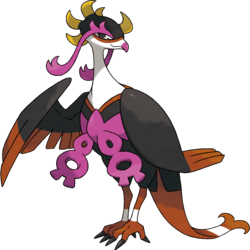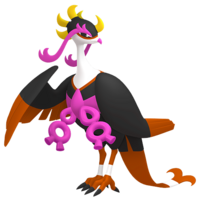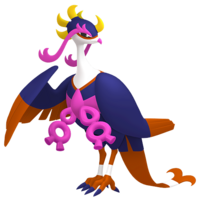From Bulbapedia, the community-driven Pokémon encyclopedia.
Revision as of 00:43, 16 September 2023
Fezandipiti (Japanese: キチキギス Kichikigisu) is a dual-type Poison/Fairy Legendary Pokémon introduced in Generation IX, with The Teal Mask.
It is not known to evolve into or from any other Pokémon.
It is associated with Ogerpon. Along with Okidogi and Munkidori, it is a member of the Loyal Three.
Biology
Fezandipiti is an avian Pokémon with a small head, a short beak with a magenta tip, and a long neck and legs. Its plumage is primarily black, with white on its head and neck, and bronze accents on its face, collar, and wing tips. It stands atop a pair of long slender bronze-colored legs having three-toed feet with sharp claws, and its tail consists of a long train of bronze-colored feathers ending in forked tips that gently curl outwards. A single white stripe accents each of its legs and tail. A crest of black feathers resembling a cap sits atop Fezandipiti's head, with golden feathers sticking out resembling a royal crown. A pair of magenta plumes also sits just above each of Fezandipiti's eyes like eyebrows and extend like long streamers with forked ends. Hanging from Fezandipiti's chest is a pair of magenta chains, protruding from a shawl-like feature that wraps its body. Despite its feminine appearance, it is a male-only species with no female counterpart.
In Kitakami myths, it is said that Fezandipiti was once a common-looking, weak Pokémon, but thanks to its Toxic Chain around its body, it transformed, enhancing its capabilities and giving it beautiful looks and a lovely voice. It possesses powerful pheromones, capable of captivating both humans and Pokémon with a beat of its glossy wings to scatter them through the air. It traveled from a distant land with Okidogi and Munkidori to steal Ogerpon's four masks and claim them for themselves. The trio sneaked into Ogerpon's cave and managed to steal three of them while Ogerpon's friend managed to protect one of them. After finding out, Ogerpon discovered about what had happened and beat the trio up, with Fezandipiti losing its life in the fight along with its partners. In the villagers' eyes though, it looked like the trio had fallen protecting the village from the enraged ogre, nicknaming them the Loyal Three and giving them a proper burial while Ogerpon retreated back to Oni Mountain.
Fezandipiti, together with Okidogi and Munkidori, are known as the Loyal Three, the heroes of Kitakami. The three are beloved by the people of Kitakami as heroes that once protected the land from the "evil ogre",[1] and stone statues bearing their likenesses were made by the people as an expression of their gratitude right where the three had been buried.[2] According to locals, worshipping Fezandipiti leads to both good luck and serendipitous things happening. By consuming the Kitakami Mochis, Fezandipiti can become a Titan Pokémon.
Game data
Pokédex entries
| This Pokémon was unavailable prior to Generation IX.
|
| Generation IX
|
|
Paldea
#—
|
|
Kitakami
#199
|
| Scarlet
|
Fezandipiti owes its beautiful looks and lovely voice to the toxic stimulants emanating from the chain wrapped around its body.
|
| Violet
|
Fezandipiti beats its glossy wings to scatter pheromones that captivate people and Pokémon.
|
|
|
Game locations
| This Pokémon was unavailable prior to Generation IX.
|
|
|
In side games
Held items
Stats
Base stats
| Stat
|
Range
|
| At Lv. 50
|
At Lv. 100
|
88
|
|
148 - 195
|
286 - 380
|
91
|
|
86 - 157
|
168 - 309
|
82
|
|
78 - 147
|
152 - 289
|
70
|
|
67 - 134
|
130 - 262
|
125
|
|
117 - 194
|
229 - 383
|
99
|
|
93 - 166
|
182 - 326
|
Total: 555
|
Other Pokémon with this total
|
- Minimum stats are calculated with 0 EVs, IVs of 0, and (if applicable) a hindering nature.
- Maximum stats are calculated with 252 EVs, IVs of 31, and (if applicable) a helpful nature.
|
Type effectiveness
| Under normal battle conditions in Generation IX, this Pokémon is:
|
|
|
|
|
|
|
|
|
|
|
|
|
Learnset
|
|
|
|
- Bold indicates a move that gets STAB when used by Fezandipiti
- Italic indicates a move that gets STAB only when used by an Evolution of Fezandipiti
|
|
|
|
|
- Bold indicates a move that gets STAB when used by Fezandipiti
- Italic indicates a move that gets STAB only when used by an Evolution or an alternate form of Fezandipiti
|
|
|
|
|
- Moves marked with an asterisk (*) must be chain bred onto Fezandipiti
- Bold indicates a move that gets STAB when used by Fezandipiti
- Italic indicates a move that gets STAB only when used by an Evolution of Fezandipiti
|
Side game data
Pokémon GO
| File:GO1016.png
|
Base HP: 204
|
Base Attack: 185
|
Base Defense: 228
|
| Egg Distance: N/A km
|
Buddy Distance: km
|
Evolution Requirement: N/A
|
| Fast Attacks:
|
| Charged Attacks:
|
|
|
Evolution data
Sprites
| This Pokémon was unavailable prior to Generation IX.
|
|
|
|
|
Trivia
Origin
Fezandipiti may be based on a pheasant. It also bears resemblance to a hoatzin.
Fezandipiti, together with Okidogi, Munkidori, and Ogerpon, may reference the Japanese folktale of Momotarō. The tale relates the titular Momotarō, a boy born from inside a peach, who traveled alongside a talking dog, monkey, and pheasant to fight a band of oni (a Japanese folkloric creature commonly equated to ogres in translations). The purple chain on its waist resembles an obi belt.
Name origin
Fezandipiti may be a combination of pheasant and serendipity (an unexpected but auspicious happening).
Kichikigisu may be a combination of 吉 kichi (fortune) and 雉子 kigisu (archaic reading of pheasant).
In other languages
| Language
|
Title
|
Meaning
|
 Japanese Japanese
|
キチキギス Kichikigisu
|
From 吉 kichi and 雉子 kigisu
|
 French French
|
Favianos
|
From faveur, avian, and φασιανός fasianós
|
 Spanish Spanish
|
Fezandipiti
|
Same as English name
|
 German German
|
Beatori
|
From beatus and 鳥 tori
|
 Italian Italian
|
Fezandipiti
|
Same as English name
|
 Korean Korean
|
기로치 Girochi
|
From 길하다 gilhada, 그렇지 geureohji, and 치 (雉) chi
|
 Mandarin Chinese Mandarin Chinese
|
吉雉雞 / 吉雉鸡 Jízhìjī
|
From 吉 jí and 雉雞 / 雉鸡 zhìjī
|
 Cantonese Chinese Cantonese Chinese
|
吉雉雞 Gātjihgāi
|
From 吉 gāt and 雉雞 jihgāi
|
|
|
|
|
|
|
|
Related articles
References
External links

|
This Pokémon article is part of Project Pokédex, a Bulbapedia project that aims to write comprehensive articles on each Pokémon species, as well as Pokémon groups and forms.
|
 For other sprites and images, please see Fezandipiti images on the Bulbagarden Archives.
For other sprites and images, please see Fezandipiti images on the Bulbagarden Archives.



